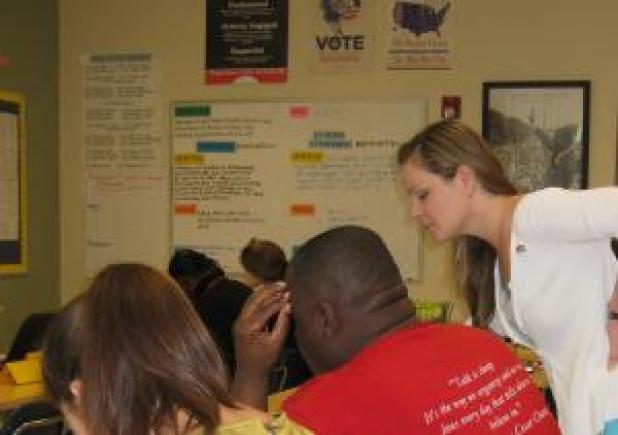
Julie Harris Stern (standing, right) helps a student in a concept-based classroom. As a consultant with Education To Save the World, Stern has worked with clients in North America, South America, Asia and Africa over the past 15 years. The 1997 graduate of Marksville High is a leading advocate of the concept-based method of teaching. {Photo from Education To Save the World website}
Marksville native changing way teachers teach
It may not be a book you take to the beach to peruse while you work on your tan or to snuggle up with in front of the fireplace to read on a cold winter night. Still, Julie Harris Stern’s new books, "Tools for Teaching Conceptual Understanding" -- one for elementary grades and one for secondary grades -- are getting rave reviews from those who do read books about educational philosophies and instructional techniques.
Stern is a 1997 graduate of Marksville High and has worked as a teacher and instructional coach on four continents -- Asia, Africa, North and South America -- over the past 20 years.
Stern just returned from a two-year assignment as head of Professional Learning at the Colegio Anglo Colombiano in Bogota, Colombia, a large International Baccalaureate school. She is now working in her independent consulting position with Education to Save the World in Great Falls, Va., outside of Washington, D.C.
Her parents, Gordon and Justine Harris, moved away from this area many years ago, but she still has friends from her school days here. Her parents also live in Great Falls.
Her co-authors for the secondary education book are Krista Ferraro of Boston and Juliet Mohnkern of San Diego. Co-authors for the elementary education book are Ferraro and Nathalie Lauriault of Ontario, Canada.
She taught Social Studies in Washington, D.C., and New Orleans for several years before becoming the Public Policy/ Curriculum Innovation director for Cesar Chavez Public Charter School in Washington, D.C. and then becoming an education consultant in 2012.
‘WE MUST CHANGE’
Stern said it is important that teachers change the way they teach, from the “traditional” fact-based instructional model to a “concept-based” approach.
“We must change the way we teach,” Stern said. “Students don’t naturally see the big idea and the facts behind all of the content in what they are taught.
“The main difference in concept-based education and more traditional methods of teaching is that when teachers lecture, they talk about a single concept,” Stern continued. “Research shows that those who become experts in a field connect all of these single concepts so that they see the big picture.”
Stern compared the traditional method of teaching to providing students a series of dots. Good students will take those facts and “connect the dots” to get the “big picture.”
In a “concept-based” class, the students would, in effect, be told what the “finished picture” looks like when all the dots are connected. In short, they learn the concept at the same time they learn the individual facts.
“Teachers need to be intentional in teaching kids these big ideas and not leave it to chance that they will ‘connect the dots,’” Stern said. “Many don’t.”
Stern said students with good study habits can succeed in the lecture-and-learn method of instruction, but others won’t. The good students do even better when presented the material in a concept-based instructional method.
“The longer students are in school with a traditional, fact-centered curriculum, the more effort we have to make to change their mindsets about what learning is and should be,” Stern said.
In her book, she uses the terms “expert” and “novice” to describe the different levels of learning and comprehension.
An “expert” is someone who “understands the facts and ideas in the context of a conceptual framework,” she said.
A “novice,” or beginner in a field of study, “has to work hard to memorize what seem like disparate pieces of information while an advanced practitioner stores knowledge in associated categories, something like a giant filing cabinet in the brain.”
She said today’s standards and curricula “are not typically organized in the context of a conceptual framework, and educators rarely make this organization explicit to students.”
Stern said students still need to be well-grounded in the facts of a subject. She said it is a “false choice” when schools are told they have to either continue “teaching centuries-old ways of organizing the world through traditional disciplines such as mathematics and music or throw them out in favor of innovation and creativity in order to move into a 21st Century paradigm for teaching and learning.”
She said innovators “stand on the shoulders of past scientists and mathematicians in order to innovate. They don’t invent without a deep understanding of how the world works.”
Stern said building a concept-based curriculum “is a major and likely the best step toward transforming school for the 21st Century.
“Education fads come and go,” she continued. “Most arise from good intentions and many have positive attributes.”
However, she noted that no other initiative “does more to raise both intellectual rigor and student motivation, while also honoring the traditional disciplines and preparing students to tackle problems they’ve never seen before” than concept-based teaching does.
“We need to transform the goals of teaching and learning, and not simply change the delivery method,” she said. “When we organize our curriculum through fundamental and powerful concepts, our students are able to transfer their understanding to new situations and apply it in unique ways.
“In this way,” she concluded, “they create something innovative and world-changing -- becoming the next great innovators.”
